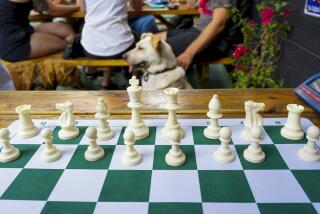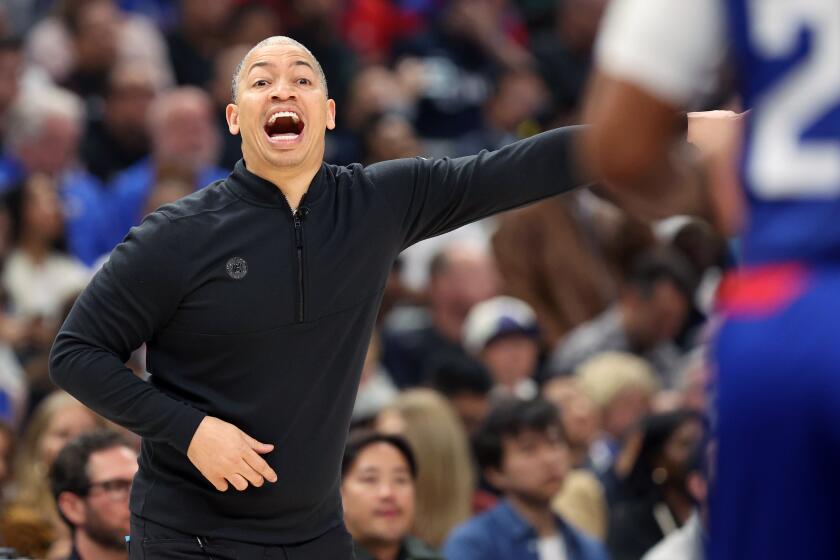Controversial Chess Title Is Won by Russian : Games: Las Vegas tournament, criticized for its unusual format, lacked three top players.
- Share via
Alexander Khalifman of Russia hit the chess jackpot Saturday by defeating Vladimir Akopian of Armenia, 3 1/2-2 1/2, in the controversial Las Vegas 1999 World Chess Federation world championship.
However, bitter chess rivalries and the tournament’s peculiar format tarnished the new champion’s crown.
Khalifman, 33, drew Saturday’s game to clinch victory in the final match of the tournament, which began July 31 with 100 contenders. He will take home $528,000, the winner’s share of the $2.4-million prize fund. Akopian, 27, earns $316,000. The others got prizes ranging from $4,800 to $138,240.
Both of the finalists defeated six opponents to set up their clash. Khalifman trailed in his first two matches, but rallied to win. Akopian compiled the best record in the preliminaries, not losing a game until Khalifman beat him twice.
Neither grandmaster was expected to reach the final. Khalifman ranked 36th in the field, and Akopian 31st.
Khalifman’s title of federation world champion is an award of uncertain value because the competition was missing the game’s three greatest stars.
In June, Garry Kasparov of Russia, the top-ranked player in history, and his designated challenger, Viswanathan Anand of India, announced plans to stage a rival $3-million Ultimate World Championship later this year.
The federation’s own champion, Anatoly Karpov of Russia, bowed out days before the tournament, frustrated by his failure to get special treatment. On Aug. 19, he sued the World Chess Federation, demanding that the winner in Las Vegas play him before assuming the status of world champion.
If the federation had called this tournament a World Cup, few would have objected. But designating it the world championship invites comparison to former championships and reopens the federation’s six-year dispute with Kasparov, regarded as the true world champion by most chess fans.
The federation held an uncontested grip on the world championship from 1948 until 1993, when Kasparov (the champion since 1985) and his official challenger left the group to conduct their championship match under the auspices of their hastily formed and short-lived Professional Chess Assn. The federation reacted to Kasparov’s defection by running a substitute 1993 championship match, won by Kasparov’s predecessor as champion, Karpov.
Kirsan Ilyumzhinov, the billionaire leader of the impoverished Russian republic of Kalmykia, won election as the federation’s president in 1995 by pledging to arrange a Kasparov vs. Karpov title-unification match. But negotiations failed, and chess, like boxing, continues to suffer from multiple champions.
Ilyumzhinov dreams of making chess an Olympic sport. To gain the approval of the International Olympic Committee, he changed the format from the traditional long match between a champion and a challenger to a seven-round, 100-player knockout tournament.
The new format required five rounds of two-game matches, a four-game semifinal, and a six-game final. The numerous 1-1 ties, as well as a 2-2 semifinal tie, were broken by sets of ever-quicker games, dropping from the standard four hours to battles as brief as five minutes per player. At such speeds, even the best grandmasters make serious mistakes, and one blunder can eliminate a contender.
Many of the 100 invitees to the 1997 inaugural event in the Netherlands ignored the chancy nature of these details and the clause that allowed Karpov to skip all of the preliminary rounds and play a six-game match in Switzerland against the sole survivor. They focused on the $4-million prize fund.
The outcries came later, after Karpov, a supposed underdog, defeated Anand in a match in Switzerland in the first week of 1998. Many complained that Karpov enjoyed an unfair advantage against an opponent exhausted by the monthlong preliminaries.
For 1999, the federation tightened the rules, offering Karpov and 27 other favorites only a first-round bye. Karpov balked at the deal that everyone else accepted.
Ilyumzhinov, who boasts that he has invested $22 million in chess, preempted other objections by offering $2.4 million in prize money and promising to make the lucrative tournament an annual event.
That is a powerful incentive to most grandmasters. Kasparov and Karpov are millionaires, but only a handful of other professionals earn six-figure incomes. For most, a chess career means a tight budget.
When Akopian reached the quarterfinal stage, guaranteeing himself about $70,000, he said: “I will earn more money here than I could earn in three or four years otherwise.”
From his Moscow Web site, www.clubkasparov.ru, Kasparov scoffs at the federation’s system of choosing its champion. He derided the tournament as “a casino show where spectators are enjoying blunders and mistakes,” then described Khalifman as “a strong, talented player, but at age 33 he could hardly be called a big discovery.”
More to Read
Go beyond the scoreboard
Get the latest on L.A.'s teams in the daily Sports Report newsletter.
You may occasionally receive promotional content from the Los Angeles Times.








